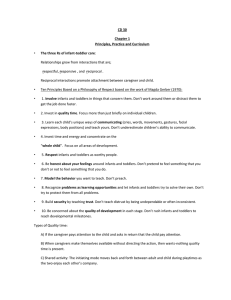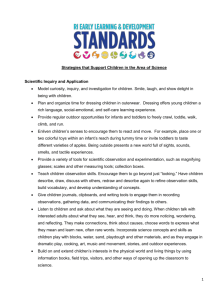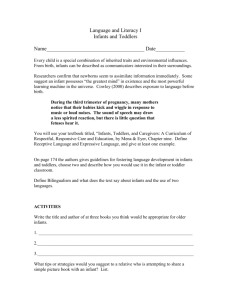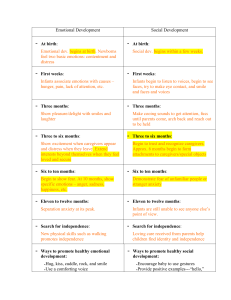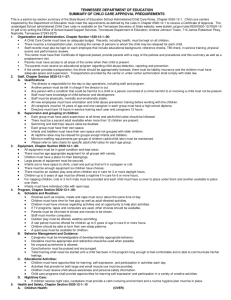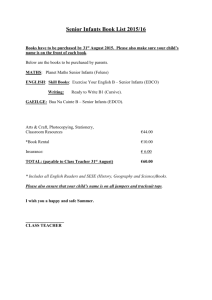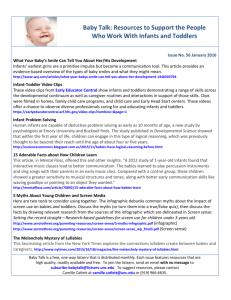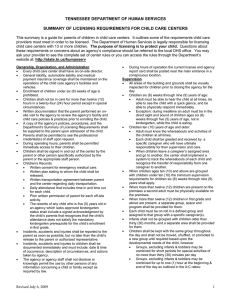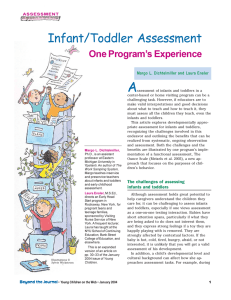summary of child care approval requirements
advertisement
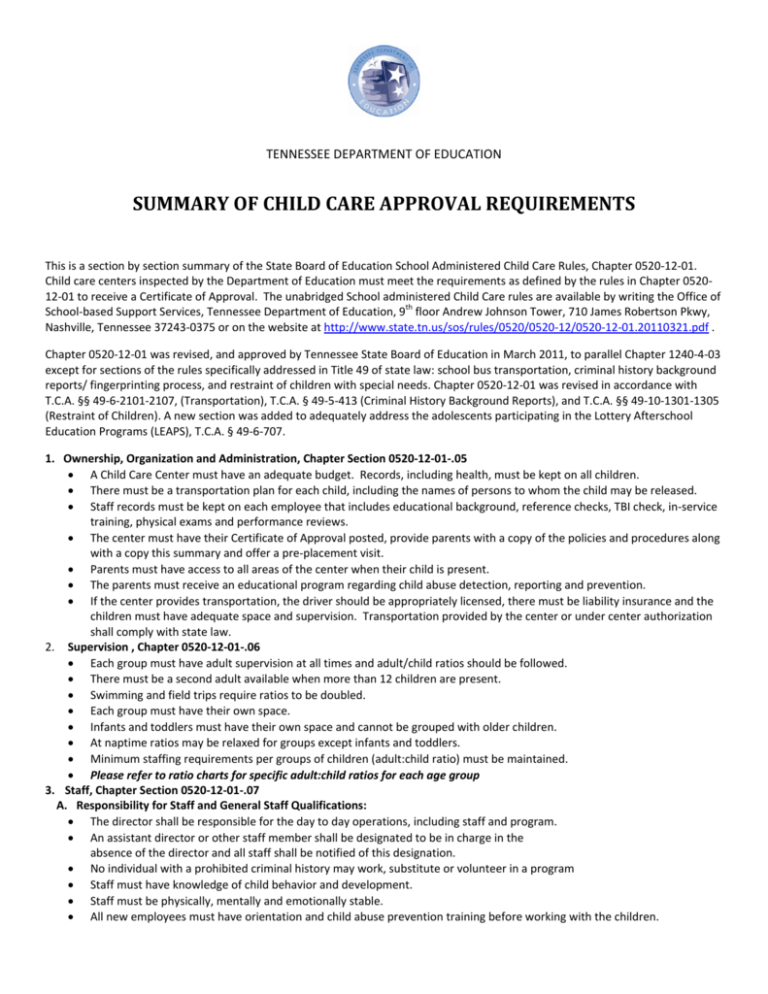
TENNESSEE DEPARTMENT OF EDUCATION SUMMARY OF CHILD CARE APPROVAL REQUIREMENTS This is a section by section summary of the State Board of Education School Administered Child Care Rules, Chapter 0520-12-01. Child care centers inspected by the Department of Education must meet the requirements as defined by the rules in Chapter 052012-01 to receive a Certificate of Approval. The unabridged School administered Child Care rules are available by writing the Office of School-based Support Services, Tennessee Department of Education, 9th floor Andrew Johnson Tower, 710 James Robertson Pkwy, Nashville, Tennessee 37243-0375 or on the website at http://www.state.tn.us/sos/rules/0520/0520-12/0520-12-01.20110321.pdf . Chapter 0520-12-01 was revised, and approved by Tennessee State Board of Education in March 2011, to parallel Chapter 1240-4-03 except for sections of the rules specifically addressed in Title 49 of state law: school bus transportation, criminal history background reports/ fingerprinting process, and restraint of children with special needs. Chapter 0520-12-01 was revised in accordance with T.C.A. §§ 49-6-2101-2107, (Transportation), T.C.A. § 49-5-413 (Criminal History Background Reports), and T.C.A. §§ 49-10-1301-1305 (Restraint of Children). A new section was added to adequately address the adolescents participating in the Lottery Afterschool Education Programs (LEAPS), T.C.A. § 49-6-707. 1. Ownership, Organization and Administration, Chapter Section 0520-12-01-.05 A Child Care Center must have an adequate budget. Records, including health, must be kept on all children. There must be a transportation plan for each child, including the names of persons to whom the child may be released. Staff records must be kept on each employee that includes educational background, reference checks, TBI check, in-service training, physical exams and performance reviews. The center must have their Certificate of Approval posted, provide parents with a copy of the policies and procedures along with a copy this summary and offer a pre-placement visit. Parents must have access to all areas of the center when their child is present. The parents must receive an educational program regarding child abuse detection, reporting and prevention. If the center provides transportation, the driver should be appropriately licensed, there must be liability insurance and the children must have adequate space and supervision. Transportation provided by the center or under center authorization shall comply with state law. 2. Supervision , Chapter 0520-12-01-.06 Each group must have adult supervision at all times and adult/child ratios should be followed. There must be a second adult available when more than 12 children are present. Swimming and field trips require ratios to be doubled. Each group must have their own space. Infants and toddlers must have their own space and cannot be grouped with older children. At naptime ratios may be relaxed for groups except infants and toddlers. Minimum staffing requirements per groups of children (adult:child ratio) must be maintained. Please refer to ratio charts for specific adult:child ratios for each age group 3. Staff, Chapter Section 0520-12-01-.07 A. Responsibility for Staff and General Staff Qualifications: The director shall be responsible for the day to day operations, including staff and program. An assistant director or other staff member shall be designated to be in charge in the absence of the director and all staff shall be notified of this designation. No individual with a prohibited criminal history may work, substitute or volunteer in a program Staff must have knowledge of child behavior and development. Staff must be physically, mentally and emotionally stable. All new employees must have orientation and child abuse prevention training before working with the children. The director must have High School Diploma (or Department recognized equivalent), and Tennessee Early Childhood Training Alliance (TECTA) certificate for completing thirty (30) clock hours of orientation training, or the equivalent as recognized by the Department and 4 years experience working with children. All caregivers must be 18 years of age and one caregiver in each group must have a high school diploma. Directors must have 18 clock hours in-service training each year and caregivers 12 clock hours. 4. Equipment for Children, Chapter Section 0520-12-01-.08 All indoor and outdoor equipment shall be well made, safe and kept clean. There must be developmentally appropriate equipment for all age groups with variety. Children must have a place for their belongings. Large pieces of equipment must be secured. Infants are to have space to climb, crawl and pull up without the restraint of playpens or cribs. There must be enough equipment so children have choices. There shall be an outdoor play area when children are in care for 3 or more daylight hours. Children up to 5 years of age must be offered a naptime if in care for 6 or more hours. There shall be equipment for napping or sleeping for each preschool child who is in care for six (6) hours or more. For napping children, cots or 2 inch mats must be provided and each child must have a cover to place under them and another available to place over them. Infants must have individual cribs with open tops. 5. Program, Chapter Section 0520-12-01-.09 A. Schedule and Routines. Routines such as snacks, meals, and rest shall occur at approximately the same time each day. There shall be a balance between child’s choice and adult-directed activities. Other activity choices shall be available to children during television/movie viewing or computer use. Parents shall be informed of movie showings and video/computer games and their ratings. Computers, if used, shall be located in view of a caregiver for monitoring purposes. An opportunity for outdoor play shall be extended to children of all ages who are in care more than three (3) daylight hours; when the temperature range, after adjustment for wind chill and heat index, is between thirty-two (32) degrees and ninety-five (95) degrees Fahrenheit and not raining. A reclining rest period of at least one (1) hour shall be provided for all preschool children in care for six (6) hours or more. Each child shall be allowed to form his own patterns of sleep. B. Behavior Management and Guidance. Spanking or any other type of corporal punishment is prohibited. (“Corporal punishment” is the infliction of bodily pain as a penalty for behavior of which the punisher disapproves.) Praise and encouragement of good behavior shall be used. When a child is engaging in unacceptable behavior the caregiver shall, prior to disciplining the child, first distract the child’s attention and substitute a desirable activity. Attention spans and skills of children shall be considered so that caregivers do not require children to engage in developmentally inappropriate behavior. Toilet training shall never be started until a child has been in the program long enough to feel comfortable and is able to communicate a need to use the bathroom. C. Educational Activities A daily program shall provide opportunities for learning, self-expression, and participation in a variety of creative activities such as art, music, literature, dramatic play, science, and health. Indoor physical activities, requiring children to use both large and small muscles, shall be provided for children of each age group. For ages three (3) through school-age, the curriculum shall include instruction in personal safety as needed but at least once a year. A daily program shall provide opportunities for learning, self-expression, and participation in a variety of creative activities such as art, music, literature, dramatic play, science, and health. D. Nighttime Care If children receive night care, caretakers must provide a calm, nurturing environment and a routine hygiene plan must be in place. 6. Health and Safety, Chapter 0520-12-01-.10 A. Children’s Health Children’s health records shall be maintained as directed under subchapter 0520-12-01-.05. Each child shall be immunized according to the current Department of Health guidelines unless exempted pursuant to subchapter 0520-12-01-.05(8). Programs serving non-school-age children shall maintain written policies for dis-enrollment of children who fail to comply with Department of Health immunization guidelines in a timely manner. Parents of every child enrolled shall be notified immediately if any communicable disease has been introduced into the program: Parents must be notified if their child is hurt and becomes ill. Medications must be labeled with instructions and must be kept under lock. Documentation of administration and side effects of any medication given must be kept. Smoking is not permitted in the presence of children. The diapering area must be appropriate, near hand washing lavatory and cleaned after each diaper change. B. Staff Health Staff must have documentation that the staff person is capable of safely and appropriately providing care for children in a group setting. The documentation shall be on file within ten (10) calendar days of employment or starting to work. A statement of mental or emotional health shall be obtained from a psychiatrist or clinical psychologist when deemed necessary by the Department. Physicals are required every 3 years. C. Safety There shall be a staff member present at all times who has current certification in CPR and first aid training. A first aid kit must be on the premises as well as a first aid chart. There shall be no firearms on the premises. Emergency telephone numbers shall be posted next to all telephones and be readily available to any staff member Kitchen knives and other potentially dangerous utensils or tools shall be secured so that they are not accessible to children. 7. Food, Chapter Section 0520-12-01-.11 A. Nutritional Needs Children will receive meals and snacks based on the amount of time spent in the program. Menus must be posted. Consideration must be given to daily food requirements when planning menu. Special diets and instructions must be provided in writing. New foods shall be introduced to infants and toddlers one at a time over a five (5) to seven (7) day period with parent’s approval. Parents and caregivers shall work together when weaning an infant to insure consistency in the weaning process. Weaning shall be delayed until after an infant adjusts to group care. B. Meal Service At mealtime, children shall be seated at appropriately sized tables and chairs, and adults shall supervise them in accordance with subsection 0520-12-01-.06(1)(d). Milk shall be placed immediately in the refrigerator. All formulas remaining in bottles after feeding shall be discarded. Previously opened baby food jars shall not be accepted in the center. If food is fed directly from the jar by the caregiver, the jar shall be used for only one feeding. Infants shall be held while being fed as long as they are unable to sit in a high chair, an infant seat, or at the table. 8. Physical Facilities, Chapter Section 0520-12-1-.12 All facilities shall annually pass an inspection verifying compliance with all applicable state and local fire and environmental requirements. There shall be a working telephone in the center. A minimum of thirty (30) square feet of usable indoor play space shall be provided for each child. Outdoor play areas shall contain a minimum of fifty (50) square feet of usable play space for each child using the area at one time. 9. Care of Children with Special Needs, Chapter Section 0520-12-01-.14 When children with special needs are enrolled, all reasonable and appropriate efforts shall be made to provide those children equal opportunity to participate in the same program activities as their peers. Adaptations to the environment shall be directed toward normalizing the lifestyle of the child with a disability by helping him/her become independent and develop self-help skills. The program shall inform parents of any specialized services available from the program, and if the program is aware of any specialized services available through third parties, shall additionally inform the parent of such services. Governing agency shall develop policies and procedures, in accordance with 0520-01-09-.23, governing personnel authorized to use isolation and restraint, training requirements and incident reporting procedures. 10. After School Programs serving Adolescents 0520-12-01-.15 Rules are modified to meet the appropriate developmental stages of the adolescent regarding staff ratios and supervision as well as activities appropriate for this age group. COMPLAINT HOTLINE NASHVILLE AREA: 615-313-4820 LONG DISTANCE: 1-800-462-8261 CHILD ABUSE HOT LINE STATEWIDE: 1-877-237-0004 (Hotline for schools only: 1-855-209-4226)

